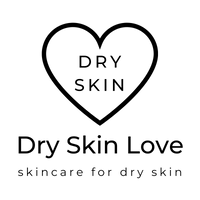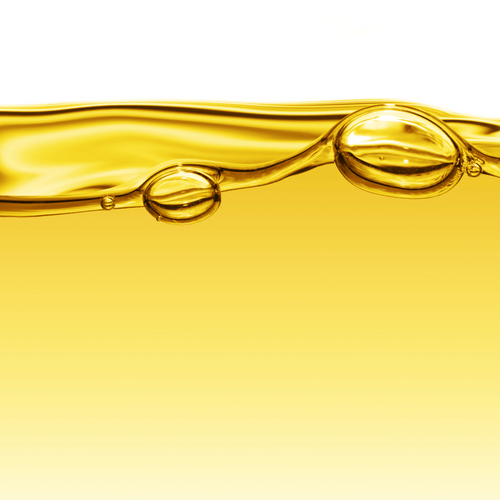There are many beneficial fats and lipids that are naturally found in the lipid barrier and skin barrier and play a critical role in keeping your skin healthy.
To protect your skin's lipid barrier and prevent dry skin, use topical emollients, carrier oils and essential fatty acids, such as omega-6 linoleic acid.
Try a Face Oil such as Dry Skin Love Apple Elixir 5% Vitamin E Face Oil.
This article will discuss:
- What is the lipid barrier?
- What are beneficial fats in the lipid barrier?
- How to protect your lipid barrier
- Emollients
- Carrier oils
- Linoleic acid
- Occlusives
- Summary
- References

What is the lipid barrier?
The lipid barrier is a part of the skin barrier.
The surface of your skin is covered by a layer of protective fats, including epidermal lipids and sebum.
Epidermal lipids include:
- Ceramides
- Free Fatty Acids
- Cholesterol
Epidermal lipids are released from keratinocytes (skin cells), and are a mixture of ceramides, free fatty acids and cholesterol. These lipids are released from skin cells and fill the spaces between the cells, like mortar or cement (Pappas, 2009).
Sebum is made of:
- Triglycerides
- Wax esters
- Squalene
Sebum is an oily, waxy substance produced by your body’s sebaceous glands and eventually released to the surface of the skin. Sebum is primarily made up of non-polar lipids as triglycerides, wax esters and squalene. Sebum coats the skin, seals in moisture, and protects your skin from getting too dry (Pappas, 2009).

What are beneficial fats in the lipid barrier?
There are many beneficial fats and lipids that are naturally found in the lipid barrier and skin barrier and play a critical role in keeping your skin healthy.
The surface of your skin is covered by a layer of protective fats, including epidermal lipids and sebum.
Beneficial fats and lipids help to lubricate and coat your skin cells and nourish your skin.
Beneficial lipids:
- Strengthen the skin barrier
- Improve the appearance of skin
- Make skin feel soft and smooth
- Reduce the appearance of fine lines and wrinkles
- Relieve dry skin, flaking and scaling
- Relieve itching due to dry skin
- Reduce the appearance of redness
Learn more: Lipid Barrier - Beneficial Fats in The Skin Barrier

How to protect your lipid barrier
There are several ingredients that can protect your lipid barrier:
- Emollients
- Carrier oils
- Linoleic acid
- Occlusives
1. Emollients can protect your lipid barrier
Emollients soften your skin.
Skincare ingredients that function as emollients include plant butters, vegetable and fruit oils, animal fats, and esters.
Products that function as emollients include moisturizers, creams, oils, serums, and balms.
What are the benefits of emollients?
The function of emollients in skincare is to soften the skin, help the skin retain its moisture and to support the skin’s barrier function.
Skin that does not have sufficient lipid content on its surface can appear dull, dry and rough. Emollients "fill in the gaps" in the skin barrier and soften it along with giving it a healthier look
The role of emollients in the treatment of dry skin conditions is often underestimated.
Emollients promote optimal skin health and prevent skin breakdown, and their use can improve quality of life (Moncrieff et al, 2013; Newton et al, 2021).
Emollients are skin conditioning – the give skin a soft and smooth appearance, restoring suppleness and improving elasticity (Brown et al, 2005).
Learn more: What are Emollients? Best Emollients for Dry Skin

2. Carrier oils can protect your lipid barrier
There are many sources of beneficial lipids for skin, including virgin coconut oil and apple seed oil.
Carrier oils are emollients and can replenish your skin barrier.
Virgin coconut oil is rich in beneficial fats for the lipid barrier
Virgin Coconut oil is easily absorbed into your skin and has clinically been shown to soften and lubricate dry skin (Agero et al, 2004; Verallo-Rowell et al, 2008; Evangelista et al, 2014).
Virgin coconut oil contains fatty acids including lauric acid (49%), myristic acid (18%), palmitic acid (8%), caprylic acid (8%), capric acid (7%), oleic acid (6%), linoleic acid (2%), and stearic acid (2%).
These beneficial fatty acids help nourish your skin to reduce the appearance of fine lines and wrinkles for plumper looking skin.
Read more: Benefits of Virgin Coconut Oil for Your Dry Skin

Apple seed oil is rich in beneficial fats for the lipid barrier
Apple seed oil is rich in beneficial fatty acids, including n-6 linoleic acid (60%), n-9 oleic acid (30%) and palmitic acid (7%), which can soften and smooth your skin, and strengthen your skin barrier.
Apple seed oil is rich in various forms of vitamin E and polyphenols and has strong antioxidant activity.
Learn more: Benefits of Apple Seed Oil for Dry Skin

3. Linoleic acid can protect your lipid barrier
Linoleic acid is an essential fatty acid found naturally in healthy skin.
Linoleic acid is an essential nutrient, and your body must get linoleic acid through diet or supplements. Linoleic acid is essential for growth, reproduction, and skin function (Huang et al, 2018).
Linoleic acid belongs to the family of omega 6 polyunsaturated fatty acids (PUFAs).
Carrier oils rich in linoleic acid can soften, smooth and lubricate the skin.
Linoleic acid can be applied topically to your skin and has numerous benefits.
- Linoleic acid is an emollient and softens your skin
- Linoleic acid strengthens the skin barrier
- Linoleic acid improves dry skin symptoms
Learn more: What is Linoleic Acid? Omega 6 Essential Fatty Acid for Dry Skin

4. Occlusives can protect your lipid barrier
Occlusives are skincare ingredients or products that form a protective film that prevents moisture loss from the skin.
They are usually oily or waxy.
Occlusives include:
- Mineral oil
- Petrolatum
- Lanolin - from sheep's wool
- Beeswax
- Cocoa Butter
- Jojoba oil
Occlusives such as jojoba oil can protect your skin's lipid barrier.
Jojoba oil is a unique oil that is made of liquid wax esters.
Jojoba oil is highly emollient, non-greasy and quickly absorbed, leaving your skin with a silky feel.
Learn more: What is Jojoba Oil?

Summary
The surface of your skin is covered by a layer of beneficial fats, including epidermal lipids and sebum.
These natural fats and lipids help to lubricate and coat your skin cells and nourish your skin.
To protect your lipid barrier:
- Use emollients for dry skin
- Use carrier oils for dry skin
- Use linoleic acid for dry skin
- Use occlusives, such as jojoba oil for dry skin
To prevent dry skin, you must protect your skin barrier, including your lipid barrier.
Do you want to protect your dry skin?
Try our Dry Skin Love Apple Elixir 5% Vitamin E Face Oil.
Our Apple Elixir 5% Vitamin E Face Oil is packed with nutrient-rich plant oils including cold-pressed apple seed oil and extra virgin coconut oil and golden jojoba oil.
It contains 8 types of natural vitamin E - including tocopherols and rare tocotrienols.
Your skin will look plumper and the appearance of fine lines will be minimized.
Your skin will have a more youthful appearance.
References
Agero AL, Verallo-Rowell VM. A randomized double-blind controlled trial comparing extra virgin coconut oil with mineral oil as a moisturizer for mild to moderate xerosis. Dermatitis. 2004 Sep;15(3):109-16.
Ananthapadmanabhan KP, Mukherjee S, Chandar P. Stratum corneum fatty acids: their critical role in preserving barrier integrity during cleansing. Int J Cosmet Sci. 2013 Aug;35(4):337-45.
Ansari, M.N.; Nicolaides, N.; Fu, H.C. Fatty acid composition of the living layer and stratum corneum lipids of human sole skin epidermis. Lipids 1970, 5, 838–845.
Brown A, Butcher M. A guide to emollient therapy. Nurs Stand. 2005 Feb 23-Mar 1;19(24):68, 70, 72 passim.
Downing, D.T., Strauss, J.S. and Pochi, P.E. Variability in the chemical composition of human skin surface lipids. J. Invest. Dermatol. 53, 322–327 (1969).
Evangelista MT, Abad-Casintahan F, Lopez-Villafuerte L. The effect of topical virgin coconut oil on SCORAD index, transepidermal water loss, and skin capacitance in mild to moderate pediatric atopic dermatitis: a randomized, double-blind, clinical trial. Int J Dermatol. 2014 Jan;53(1):100-8.
Huang TH, Wang PW, Yang SC, Chou WL, Fang JY. Cosmetic and Therapeutic Applications of Fish Oil's Fatty Acids on the Skin. 2018 Jul 30;16(8):256.
Ishikawa J, Yoshida H, Ito S, Naoe A, Fujimura T, Kitahara T, Takema Y, Zerweck C, Grove GL. Dry skin in the winter is related to the ceramide profile in the stratum corneum and can be improved by treatment with a Eucalyptus extract. J Cosmet Dermatol. 2013 Mar;12(1):3-11.
Kang, L.; Ho, P.C.; Chan, S.Y. Interactions between a skin penetration enhancer and the main components of human stratum corneum lipids. J. Therm. Anal. Calorim. 2006, 83, 27–30.
Lin TK, Zhong L, Santiago JL. Anti-Inflammatory and Skin Barrier Repair Effects of Topical Application of Some Plant Oils. Int J Mol Sci. 2017 Dec 27;19(1):70.
Moncrieff G, Cork M, Lawton S, Kokiet S, Daly C, Clark C. Use of emollients in dry-skin conditions: consensus statement. Clin Exp Dermatol. 2013 Apr;38(3):231-8; quiz 238.
Newton H. Using emollients to promote safe and effective skin care for patients. Nurs Stand. 2021 Oct 6;36(10):77-82.
Pappas A. Epidermal surface lipids. Dermatoendocrinol. 2009 Mar;1(2):72-6.
Verallo-Rowell VM, Dillague KM, Syah-Tjundawan BS. Novel antibacterial and emollient effects of coconut and virgin olive oils in adult atopic dermatitis. Dermatitis. 2008 Nov-Dec;19(6):308-15.
Verdier-Sévrain et al. (2007). Skin hydration: a review on its molecular mechanisms. Journal of Cosmetic Dermatology, 6, 75–82.
Author Information

Dr. Natasha Ryz is the founder of Dry Skin Love Skincare. With over 10 years of experience as a formulator and a strong scientific foundation, Dr. Ryz creates products that combine the best of nature and science for transformative results.
She trained in Organic Skincare Formulation at Formula Botanica and took the Skincare Specialist Program at the School of Natural Skincare, with over 200 hours of specialized education. Dr. Ryz also holds a diploma in Beauty Brand Business Management.
Dr. Ryz’s scientific background includes a PhD in Experimental Medicine from the University of British Columbia, and she has over 15 years of research experience in microbiology, immunology, and biochemistry. This expertise informs every product she formulates, ensuring exceptional quality, efficacy, and luxury.
Why I Started A Skincare Company

